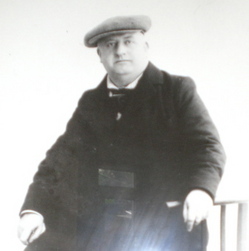
God, our Father, you called your servant, Columba, to the monastic life. You bestowed on him the grace to understand the mysteries of your Son and to make him known as the ideal for all who have been baptized. Grant that we may learn from his example to live in Christ by opening our hearts in joy to the Spirit of your Son, our Lord, who lives and reigns with you and the Holy Spirit, One God, for ever and ever. Amen.
The Church observes the feast of Blessed Columba Marmion today. He was an Irishman who became a monk in Belgium, a diocesan priest who fell in love with the Benedictine way life, its emphasis on seeking God and who served as abbot. Dom Columba died on January 30, 1923. Marmion's liturgical memorial, however, is observed not on his anniversary of death but on the anniversary of receiving the abbatial blessing, October 3, 1909. At that time the first Sunday of October was the Solemnity of the Most Holy Rosary of the Blessed Virgin Mary; in this era the feast of Our Lady of the Rosary is observed on October 7th.
Two pieces to reflect up on...
The whole of the Christian life consists in carrying Christ to birth within us and in having Him live there'. This, of course is nothing more than a paraphrase of St. Paul's injunction in Gal. 4:19: 'until Christ is formed in you'. For Marmion this is not just our final goal, it is our daily, essential task: to form Christ within us, through the Graces of the sacraments and our daily encounter with God in prayer. (Mark Tierney O.S.B, "The Life and Times of Columba Marmion")
And
... Revelation teaches us that there is an ineffable paternity in God. God is a Father: that is the fundamental dogma which all the others suppose, a magnificent dogma which leaves the reason confounded, but ravishes faith with delight and transports holy souls. God is a Father. Eternally, long before the created light rose upon the world, God begets a Son to whom He communicates His nature, His perfections, His beatitude His life, to beget is to communicate [By the gift of a similar nature ] being and life. You are My Son this day have I begotten You [Ps 2:7; Heb 1:5; 5:5], from the womb before the day - star, I begot you [Ps 110:3]. In God, then, is life, life communicated by the Father ... Creatures can only lisp when they speak of such mysteries... the Father, and the Son, with one same and indivisible Divine Nature, and both, although distinct from one another [on account of their personal properties, 'of being Father' and 'of being Son'] are united in a powerful, substantial embrace of love, whence proceeds that Third Person, Whom Revelation calls by a mysterious name: the Holy Ghost.
Such is as far as faith can know it, the secret of the inmost life of God; the fullness and the fruitfulness of this life are the source of the incommensurable bliss that the ineffable Society of the three Divine Persons possesses.
And now God - not in order to add to His plenitude, but by it to enrich other beings - exceeds, as it were, His Paternity. God decrees to call creatures to share this Divine life, so transcendent that God alone has the right to live it, this eternal life communicated by the Father to the Only Son, and by them, to the Holy Spirit ... To these mere creatures God will give the condition and sweet name of children. By nature, God has only one Son; by love, He wills to have an innumerable multitude: that is the grace of supernatural Adoption. (Dom Columba Marmion, OSB, Spiritual Writings. Ed. P. Lethiellex. Maredesous Abbey, 1998.)
A very brief note on the canonization
process of Dom Columba can be read here.


Leave a comment